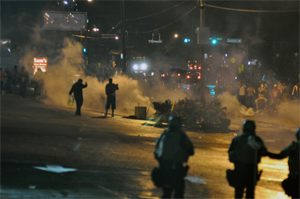Author Archives: Public Agenda Newsfeed
Restoring Opportunity
JJ Baskin, Public Agenda Board Member, 1966-2015

We're saddened to share the news that Public Agenda Board Member JJ Baskin passed away last week. With JJ's passing, the country has lost a great man and a force for good. JJ's deep commitment to improving education was matched by his boundless energy, and that energy stayed with him to the end.
We first met JJ two years ago down in Austin, Texas -- his home state. JJ's energy, dedication and optimism inspired us, and we invited him to join the Public Agenda board soon after.
JJ had so much faith in the Public Agenda mission and team. He was constantly working to advance our mission by contributing ideas and cultivating relationships. As JJ's obituary points out, he was a world-class connector who took enormous joy in serving others.
While we didn't know him long, it was long enough to know he was one of the finest people we'd ever meet. His dedication to good work and his fellow humans was a genuine inspiration, and we were lucky to experience his creativity and kindness firsthand. We at Public Agenda hope we can honor JJ's memory by capturing and channeling a little bit of his spirit, goodness and commitment to making the world a better place.
When JJ was first diagnosed with cancer, not even a year ago, he formed JJ's Fight Club. He called it a "team of optimists" and asked its members to "inspire us and remind us of what we are fighting for."
We may have lost JJ, but he will continue to inspire and remind us of what we are fighting for.
Read more about JJ and his life's work.
How Much Will It Cost?
Paying for Quality over Quantity in Health Care: Why the Public Ought to Be Engaged
Taking a Blog Pause
The Philosophical Challenge
The Philoshophical Challenge
Towards the end of his novel, Skinny Legs And All, author Tom Robbins describes his heroine’s epiphany:
"…She understood suddenly…that it was futile to work for political solutions to humanity's problems because humanity's problems were not political…The primary problems were philosophical, and until the philosophical problems were solved, the political problems would have to be solved over and over and over again."

Ferguson Day 6, Picture 44 by Loavesofbread
This insight applies particularly to the current plight of our democracy. Symptoms of its dysfunction are everywhere. Only about a third of eligible voters bother to vote in non-presidential elections. Congress is gridlocked and polarized. Our economy, our schools, our social mobility escalators, our health care, our social justice system – none of these core institutions of our democracy are working as well as they should for the majority of Americans.
The American public knows something is wrong. For decades a majority of the public has been telling pollsters that the country is "on the wrong track." When we probe into what this means, people state that they don’t feel they have a voice in shaping the decisions that most impact their lives. They experience this lack of voice as a betrayal of the promise of democracy.
The town of Ferguson illustrates what people mean by a lack of voice. Months after a white cop shot and killed an unarmed black teenager in Ferguson, a grand jury voted not to indict the white cop. These events evoked anger, frustration and widespread looting, verging on anarchy.
Ferguson had relied on the legal mechanics of democracy such as grand jury deliberations to deliver justice. The majority of Ferguson's citizens are black. They had learned to mistrust white control over the police and the legal system. When the crisis arose, there was no minimal bond of trust they could rely upon to initiate a healing process.
The philosophical challenge requires that we recognize that democracy presupposes a minimal bond of community based on trust. Conflicting groups need a core of trust to engage in the kind of dialogue that might lead to healing.
Building trust must always precede political tinkering. People must trust their political institutions to seek the common good as well as their own interests.
The strategies for building trust are very different from the day-to-day strategies of the legal system. The town of Ferguson is not that different from thousands of other towns across American who place formal legal procedures ahead of trust-building.
Robbins' insight is to grasp the reality that unless we first address the philosophical challenge of developing trust and community, "the political problems would have to be solved over and over and over again."
